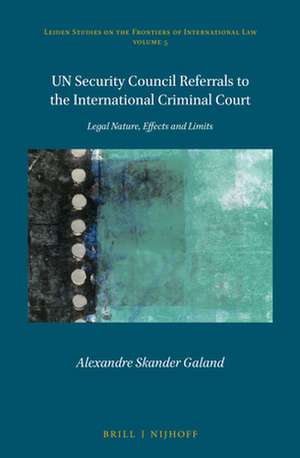UN Security Council Referrals to the International Criminal Court: Legal Nature, Effects and Limits: Leiden Studies on the Frontiers of International Law, cartea 5
Autor Alexandre Skander Galanden Limba Engleză Hardback – 5 dec 2018
Preț: 794.29 lei
Preț vechi: 968.65 lei
-18% Nou
Puncte Express: 1191
Preț estimativ în valută:
151.99€ • 159.09$ • 126.50£
151.99€ • 159.09$ • 126.50£
Carte indisponibilă temporar
Doresc să fiu notificat când acest titlu va fi disponibil:
Se trimite...
Preluare comenzi: 021 569.72.76
Specificații
ISBN-13: 9789004342224
ISBN-10: 9004342222
Pagini: 268
Dimensiuni: 155 x 235 x 22 mm
Greutate: 0.52 kg
Editura: Brill
Colecția Brill | Nijhoff
Seria Leiden Studies on the Frontiers of International Law
ISBN-10: 9004342222
Pagini: 268
Dimensiuni: 155 x 235 x 22 mm
Greutate: 0.52 kg
Editura: Brill
Colecția Brill | Nijhoff
Seria Leiden Studies on the Frontiers of International Law
Notă biografică
Alexandre Skander Galand, Ph.D. in Law (2015), European University Institute (EUI), is Post-Doctoral Researcher on the project The Individualisation of War: Reconfiguring the Ethics, Law, and Politics of Armed Conflict, conducted by the EUI in partnership with the University of Oxford. He has published articles on various aspects of international criminal law, international human rights law and international humanitarian law.
Cuprins
AcknowledgementsIntroductionMethodological Approaches The Goals of the Book Plan of the Book1 Conceptions of Courts and their Jurisdiction1 Types of Jurisdiction 2 Heads of Jurisdiction 3 Delegation of Jurisdiction 4 The Nuremberg & Tokyo Trials 5 The Nuremberg Principles and the work of the International Law Commission 6 The Ad Hoc Tribunals 7 The International Criminal Court 8 The two ‘Conceptions’ 8.1 Universal Jurisdiction Conception8.2 Chapter vii Conception9 The Amendments to the Rome Statute 9.1 The Kampala Review Conference9.2 The New York SessionConclusion2 Article 13 (b) vs State Sovereignty1 Jurisdiction to Adjudicate 1.1 Chapter vii Conception–Taking Judicial Measures under Article 41 UN Charter1.2 Universal Jurisdiction Conception–The International Community’s Right to Adjudicate International Crimes2 Jurisdiction to Prescribe 2.1 Does the Rome Statute Impose New Crimes?2.2 Chapter vii Conception–Legislating as an Enforcement Measure2.2.1 Unilateral in Form 2.2.2 Create or Modify Existing Law 2.2.3 General in Nature 2.2.4 Right to Prescribe Criminal Law (but Presumption against it) 2.2.5 Presumption Rebutted in Case of Rome Statute 2.2.6 Substantive Limits to Prescribe Criminal Law as an Enforcement Measure 2.2.6.1 Case Related Reaction 2.2.6.2 Concrete Effect 2.2.6.3 Temporary Measures 2.3 Universal Prescriptive Jurisdiction2.3.1 Treaty-based Universal Jurisdiction 2.3.2 A Sui Generis Universal Jurisdiction 2.3.3 The Rome Statute is an act of the International Community as a Whole 2.3.4 Gravity of the Crimes Conclusion3 Article 13 (b) vs Principle of Legality1 The Jurisdiction Ratione Temporis of the Court 2 The Principle of Legality 3 The Status and Scope of Nullum Crimen Sine Lege in International Human Rights Law 4 The Specificity of International Criminal Law 5 The Rome Statute Distances itself from the Previous International Criminal Tribunals 6 A Statute Applicable since its Entry into Force 6.1 Exception for the Crimes Adopted after the Entry into Force of the Statute?7 Universal Jurisdiction Conception–A Law Applicable to all since its Entry into Force 8 Chapter vii Conception–Refers the Situation since… 8.1 By Hook or by Crook–A Principle of Justice8.2 Presumption of Respect for Human Rights in Relation to the Security Council8.3 Here comes Super-Legality: Article 21 (3) Rome Statute8.4 Accessibility and Foreseeability–A Relaxed Application of the Principle of Legality8.5 A Strict Application of LegalityConclusion4 Article 13 (b) vs Immunity of State Officials1 Immunities of State Officials under International Law 2 Chapter vii Conception–The Security Council Power to Remove Immunities before International Criminal Courts 3 Universal Jurisdiction Conception–The Rome Statute Provision on Immunity Applies to All 4 The Arrest and Surrender of an Official Entitled to Immunity to the Icc 4.1 Chapter vii Conception4.1.1 Conflict between SC Referrals and other Treaty Obligations 4.2 Universal Jurisdiction ConceptionConclusion5 If Article 13 (b) Did Not Exist…1 The SC and the Icc Relationship: An ‘Amour Impossible’2 Refer a ‘Situation’ 3 Is the Icc bound by Security Council Resolutions? Or, are they simply Bound Together? 4 The ‘Chapter vii Conception’ and the Lawful Establishment of the Jurisdiction: An ‘Amour Interdit’? 4.1 Independence and Impartiality ConclusionConclusionBibliographyCasesPermanent Court of International Justice and International Court of Justice International Criminal Court International Criminal Tribunal for the former Yugoslavia International Criminal Tribunal for the former Yugoslavia Special Court for Sierra Leone Special Tribunal for Lebanon Human Rights Courts and Bodies Other CasesIndex









